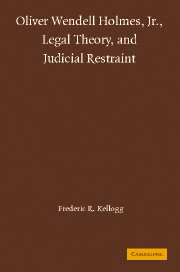Book contents
- Frontmatter
- Contents
- Preface
- 1 A Time for Law
- 2 Playing King: Connections and Misconceptions
- 3 Holmes's Conception of Law
- 4 Common Law Theory Revisited
- 5 Holmes and Legal Classification
- 6 The General Theory of Liability
- 7 Morals and Skepticism in Law
- 8 Judges, Principles, and Policy
- 9 Common Law Constitutionalism
- 10 Holmes's Theory in Retrospect
- 11 Conclusion
- Appendix
- Bibliography
- Index
8 - Judges, Principles, and Policy
Published online by Cambridge University Press: 24 July 2009
- Frontmatter
- Contents
- Preface
- 1 A Time for Law
- 2 Playing King: Connections and Misconceptions
- 3 Holmes's Conception of Law
- 4 Common Law Theory Revisited
- 5 Holmes and Legal Classification
- 6 The General Theory of Liability
- 7 Morals and Skepticism in Law
- 8 Judges, Principles, and Policy
- 9 Common Law Constitutionalism
- 10 Holmes's Theory in Retrospect
- 11 Conclusion
- Appendix
- Bibliography
- Index
Summary
Questions of policy are legislative questions, and judges are shy of reasoning from such grounds. Therefore, decisions for or against the privilege, which really can stand only upon such grounds, often are presented as hollow deductions from empty general propositions like sic utere tuo ut alienum non laedas, which teaches nothing but a benevolent yearning, or else are put as if they themselves embodied a postulate of the law and admitted of no further deduction, as when it is said that, although there is temporal damage, there is no wrong; whereas, the very thing to be found out is whether there is a wrong or not, and if not, why not.
O. W. Holmes, “Privilege, Malice, and Intent” (1894)At the end of the anxious carriage ride with Fanny Holmes and George Shattuck across East Cambridge on December 8, 1882, lay Holmes's appointment to the Supreme Judicial Court of Massachusetts – the “SJC,” as lawyers call it. It would present him with a large workload and broad, basically unlimited appellate jurisdiction, ruling on all appeals, criminal and civil. Much of the work was as mundane as any state court of its era, ranging through crimes, injuries to body, property, and land, business and domestic relations, and local regulation.
Holmes soon wrote Pollock, “No very great or burning questions have been before me although a good many fairly interesting ones.” Their correspondence reveals that “interesting” to Holmes meant capable of testing or confirming “some theories of [his] book.”
- Type
- Chapter
- Information
- Oliver Wendell Holmes, Jr., Legal Theory, and Judicial Restraint , pp. 118 - 136Publisher: Cambridge University PressPrint publication year: 2006



